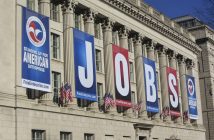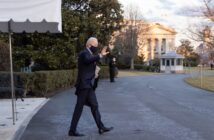Even in a normal job market, it is hard to fathom the Department of Labor (DOL) would “let H-1B employers undercut” over qualified American applicants so they can insource foreign workers, who they pay at below-market wage levels. Yet, that is exactly what is occurring, according to a new report from the non-partisan Economic Policy Institute (EPI).
While in “desperate need of reform,” the report asserts the “fundamental flaw of the H-1B program is that it permits U.S. employers to legally underpay H-1B workers relative to U.S. workers in similar occupations in the same region.”
Another flaw – and a prevalent misperception – is that the H-1B program, which annually provides 85,000 temporary, nonimmigrant U.S. work visas for college-educated foreign workers, requires employers either to recruit American workers first or show evidence of a labor shortage that necessitates hiring a H-1B worker. That simply is not the case.
“Wage-level data make clear that most H-1B employers—but especially the biggest users, by nature of the sheer volume of workers they employ—are taking advantage of a flawed H-1B prevailing wage rule to underpay their workers relative to market wage standards, resulting in major savings in labor costs for companies that use the H-1B,” the report notes, adding that the data “raises serious doubts about whether H-1B employers, including the top 30 H-1B employers and major U.S. technology firms, use the program solely, or even mostly, to hire workers with truly specialized skills.”
Certainly with tens of millions of American workers recently joining the ranks of the unemployed, in addition to recent college graduates seeking to enter the labor force, these businesses would prioritize hiring citizens. Again, that is not the case. According to Bloomberg News, some businesses are “choosing to keep H-1B workers on staff to maintain their legal status, while firing U.S. workers.”
Which is why DOL addressing the “fundamental flaw” in the program is so important. The report’s authors, Daniel Costa and Ron Hira, maintain that the absence of a labor-market-test means that the only way to prevent abuse is via the wage rule. Yet, President Trump has not ordered the DOL to use its authority to change the program’s wage rules.
While tech firms are frequent users, the report says outsourcing firms use one-third to one-half of the visas “to replace thousands of U.S. workers with much-lower-paid H-1B workers while also sending tech jobs abroad.”
The report is a laundry list of reasons for the Trump administration to take immediate action to fight against any bills in Congress that would expand the program, as well as heading off current efforts to tap unused H-1B visas to hire more foreign health care workers, unless there is a demonstrated need for them.
The EPI analysis shows:
- Three-fifths of H-1B positions certified by DOL “are assigned wage levels well below the local median wage” for the so-called specialty occupations;
- The top 30 H-1B employers accounted for more than one in four H-1B petitions approved by U.S. Citizenship and Immigration Services (USCIS) in 2019;
- Among the top 30 H-1B employers, including Amazon, Microsoft, Walmart, Google, Apple, and Facebook, half have a business model that is based on outsourcing jobs; and
- Most H-1B positions are certified at wage levels that are below the median wage.
Rather than simply criticizing the H-1B program, EPI suggests the first step would be for the Labor Department to exercise its existing authority “to set the lowest wage to the 75th percentile for the occupation and local area and also require that wage offers to H-1B workers never be lower than the national median wage for the occupation.”
Furthermore, there should be a ban on hiring of H-1B workers by any employer who has violated wage and labor laws, added scrutiny to visa applications, and Congress must provide adequate funding to enable DOL to conduct random audits of H-1B employers.
Getting Congress to implement any reform is a tall mountain to climb. Past efforts, including during the 2013 immigration debate, to pass the smallest of reforms were met with heavy opposition from well-financed business lobbyists, tech giants, and mass immigration advocates. That opposition is more hardline now, so it is even more important for President Trump to take action now before any of the 30 million Americans are cheated out of a job to save the bottom line of Amazon, Microsoft or Apple.





2 Comments
Pingback: H-1B Visa Program is Government-Sanctioned Exploitation of American Workers – India Inc Blog
Pingback: The tech industry says immigration makes the US more competitive – India Inc Blog